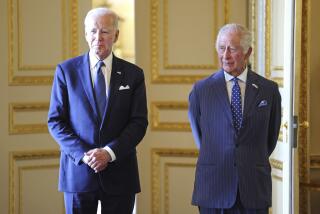U.S. Forces Ready to Strike Now if Provoked, Bush Says : Coalition: The President confers with the new British prime minister on the gulf crisis and European affairs.
- Share via
WASHINGTON — President Bush said Saturday that U.S. forces in the Persian Gulf would be ready to strike “10 minutes from now” if Iraq provoked a conflict.
Maintaining his stern daily warnings to Iraqi President Saddam Hussein, Bush countered a top Army general’s candid acknowledgment that U.S. troops will not be fully combat ready for perhaps a month after the U.N. Security Council’s Jan. 15 deadline for Iraq to withdraw from Kuwait or face the prospect of war.
“If there was some clear provocation 10 minutes from now, the allied forces are ready to respond vigorously,” Bush said in remarks at an outdoor news conference at Camp David.
Bush met at the mountaintop presidential retreat in rural Maryland with the new British prime minister, John Major, to discuss the gulf crisis, Thursday’s resignation of Soviet Foreign Minister Eduard A. Shevardnadze and U.S.-European relations.
Major, who succeeded Margaret Thatcher three weeks ago, said Britain’s firm stand with the gulf coalition has not weakened with the leadership change.
The British and other European leaders “have no plans to go further” with any talks with Hussein unless he meets the Americans first, Major said, referring to U.S.-Iraqi meetings that have been sidelined in a dispute over scheduling.
Major also rejected the notion that “Arab negotiators” might try to negotiate with Hussein after the Jan. 15 deadline passes to try to avert a war.
“There’s nothing to negotiate,” Major said in an earlier news conference. “It’s a question of Saddam Hussein’s withdrawing from Kuwait.”
Bush said that while he is still hoping for a peaceful resolution, “I am convinced that Saddam Hussein hasn’t gotten the message yet, for some odd reason.”
In public statements every day for weeks, Administration officials have attempted to keep maximum pressure on Hussein by warning that he must completely pull his troops out of Kuwait by Jan. 15 or risk U.S. attack. Lt. Gen. Calvin A. H. Waller, deputy commander of the 280,000 U.S. troops in the gulf region, appeared to dilute that signal when he said in an interview last week that key Army units would not be in place and fully trained until Feb. 15 or later.
Speaking of the turmoil in the Soviet Union, Bush voiced confidence that Soviet support for the coalition will not suffer in the absence of Shevardnadze, a strong supporter of the U.S. position.
“I am convinced from what we have received so far from the Soviet Union that their gulf policy will continue,” Bush said.
He added, “People are concerned, wondering, about the concerns raised and expressed by Mr. Shevardnadze” about the threat of dictatorship as an outgrowth of the Soviet Union’s present severe economic and political problems. “But we will continue to deal with them (the Soviets) in the future as we have in the past and hope that change takes place in a peaceful way. Life goes on.”
More to Read
Sign up for Essential California
The most important California stories and recommendations in your inbox every morning.
You may occasionally receive promotional content from the Los Angeles Times.













